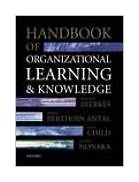|

HANDBOOK OF ORGANIZATIONAL LEARNING AND KNOWLEDGE
DIERKES M. wydawnictwo: OXFORD , rok wydania 2001, wydanie I cena netto: 450.00 Twoja cena 427,50 zł + 5% vat - dodaj do koszyka Handbook of Organizational
Learning and Knowledge
Meinolf Dierkes, Director of
the Organization and Technology Research Unit, Wissenschaftszentrum Berlin für
Sozialforschung (WZB), Germany
Ariane Berthoin Antal,
Program Leader in Organizational Learning, Wissenschaftszentrum Berlin für
Sozialforschung (WZB), Germany,
John Child, Chair of
Commerce, University of Birmingham; Distinguished Visiting Professor, Chinese Management
Centre, University of Hong Kong
Ikujiro Nonaka, Professor in
the Graduate School of International Corporate Strategy, Hitotsubashi University, and
Professor of Knowledge, University of California, Berkeley
Description
The book succeeds in
taking the reader on a journey through the many diverse approaches, themes, issues and
debates surrounding this field. European Business Forum
This handbook provides a
comprehensive overview of the concept of Organizational Learning and related issues of
knowledge in organizations. It explains its origins, current applications, and where it
may be going. It provides a full account of varied disciplinary approaches, and discusses
major issues in the field. With contributions from leading international experts, the book
will be an invaluable resource for scholars, students, and professionals.
Readership: Academic: Scholars and students within the areas of management, public
administration, organizational studies, sociology, political science, anthropology, and
behavioural and institutional economics. Practitioner: consultants and business
practitioners involved in organizational development, learning, and change
Contents/contributors
- A.
Berthoin Antal, M. Dierkes, J. Child, and I. Nonaka: Introduction: Finding Paths through
the Handbook
- Part
I: Insights from Major Social Science Disciplines
- 1
G. W. Maier, C. Prange, and L. von Rosenstiel: Psychological Perspectives on
Organizational Learning
- 2
S. Gherardi and D. Nicolini: The Sociological Foundations of Organizational Learning
- 3
P. Pawlowsky: The Treatment of Organizational Learning in Management Science
- 4
C. Boerner, J. T. Macher and D. J. Teece: A Review and Assessment of Organizational
Learning in Economic Theories
- 5
B. Czarniawska: Anthropology and Organizational Learning
- 6
J. LaPalombara: The Underestimated Contributions of Political Science to Organizational
Learning
- 7
J. Fear: Thinking Historically about Organizational Learning
- Part
II: External Triggers for Learning
- 8
L. von Rosenstiel and S. Koch: Change in Socioeconomic Values as a Trigger of
Organizational Learning
- 9
J. Kädtler: Social Movements as Triggers for Organizational Learning
- 10
H. Merkens, M. Geppert, and D. Antal: Triggers of Organizational Learning during the
Transformation Process in Central European Countries
- 11
J. Stopford: Organizational Learning as Guided Responses to Market Signals
- 12
M. Dierkes, L. Marz, and C. Teele: Technological Visions, Technological Development, and
Organizational Learning
- Part
III: Factors and Conditions Shaping Organizational Learning
- 13
J. Child and S. Heavens: The Social Constitution of Organizations and its Implications for
Organizational Learning
- 14
W. Starbuck and B. Hedberg: How Organizations Learn from Success and Failure
- 15
C. Weber and A. Berthoin Antal: The Role of Time in Organizational Learning
- 16
K. Scherer and V. Tran: Effects of Emotions on the Process of Organizational Learning
- Part
IV: Agents of Organizational Learning
- 17
V. Friedman: The Individual as Agent of Organizational Learning
- 18
P. Sadler: Leaders as Agents of Organizational Learning
- 19
R. Tainio, K. Lilja, and T. Santalainen: The Role of Boards in Facilitating or Limiting
Learning in Organizations
- 20
A. Drinkuth, C. Riegler, and R. Wolff: Labor Unions as Agents of Organizational Learning
- 21
A. Berthoin Antal and C. Krebsbach-Gnath: Consultants as Agents of Organizational
Learning: The importance of marginality
- Part
V: Processes of Organizational Learning and Knowledge Creation
- 22
I. Nonaka, R. Toyama, and P. Byosiere: A Theory of Organizational Knowledge Creation:
Understanding the dynamic process of creating knowledge
- 23
B. Büchel and S. Raub: Media Choice and Organizational Learning
- 24
B. Hedberg and R. Wolff: Organizing, Learning, and Strategizing: From construction to
delivery
- 25
J. LaPalombara: Power and Politics in Organizations: Public and private sector comparisons
- 26
J. Rothman and V. Friedman: Identity, Conflict, and Organizational Learning
- 27
A. Kieser, N. Beck, and R. Tainio: Rules and Organizational Learning: The behavioural
theory approach
- Part
V: Processes of Organizational Learning and Knowledge Global Context
- 28
K. Macharzina, M. J. Oesterle, and D. Brodel: Learning in Multinationals
- 29
J. Child: Learning Through Strategic Alliances
- 30
M. Lyles: Organizational Learning in International Joint Ventures
- 31
C. Lane: Organizational Learning in Supplier Networks
- 32
L. S. Tsui-Auch: Learning in Global and Local Networks: Experience of Chinese firms in
Hong Kong, Singapore, and Taiwan
- 33
B. Hedberg and M. Holmqvist: Learning in Imaginary Organizations
- Part
VII: Developing Learning Practices
- 34
V. Friedman, R. Lipshitz, and W. Overmeer: Creating Conditions for Organizational Learning
- 35
P. Pawlowsky, J. Förslin, and R. Reinhardt: Practices and Tools of Organizational
Learning
- 36
R. Reinhardt, M. Bornemann, P. Pawlowsky, and U. Schneider: Intellectual Capital and
Knowledge Management: Perspectives on Measuring Knowledge
- Part
VIII: Putting Knowledge into Practice
- 37
I. Nonaka, P. Reinmöller, and R. Toyama: Integrated IT Systems for Knowledge Creation
- 38
G. Galer and K. van der Heijden: Scenarios and their Contribution to Organizational
Learning: From Practice to Theory
- 39
A. Berthoin Antal, U. Lenhardt, and R. Rosenbrock: Barriers to Organizational Learning
- 40
C. Krebsbach-Gnath: Applying Theory to Organizational Transformation
- 41
C. de Haën, L. S. Tsui-Auch, and M. Alexis: Multimodal Organizational Learning: From
misbehaviour to good laboratory practices in the pharmaceutical industry
- Part
IX: Conclusion
- 42
A. Berthoin Antal, M. Dierkes, J. Child, and I. Nonaka: Organizational Learning and
Knowledge: Reflections on the dynamics of the field and challenges for the future
1000 pages
Księgarnia nie działa. Nie odpowiadamy na pytania i nie realizujemy zamówien. Do odwolania !.
|


